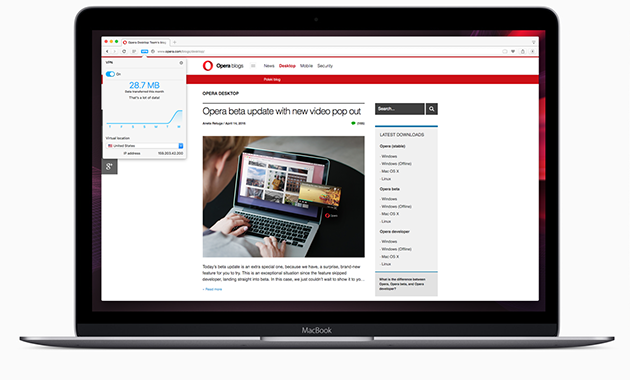Opera Browser Adds Free VPN Support Following Default Ad Blocking

Norwegian software company Opera is seeking to put privacy at the core of its web browser by launching a built-in tool to allow users to hide their computers' location, unlock firewalls and access content restricted in their country.
Opera’s built-in virtual private network (VPN) tool for its browser is launched only a month after the company announced that it would be integrating an ad blocker into the browser by default. Opera is seeking to set itself apart from Google’s Chrome, Mozilla’s Firefox and Microsoft’s Edge browsers by offering customers the ability to heavily customize their browsing experience.
Opera’s VPN tool, which uses 256-bit encryption, is the result of its acquisition of U.S.-based VPN service SurfEasy last March. Initially, the tool will allow users to set their IP address to appear to come from the U.S., Canada and Germany, with the company promising that more country options will be added in time.
“Everyone deserves to be private online if they want to be. By adding a free, unlimited VPN directly into the browser, no additional download or extensions from an unknown third-party provider are necessary,” Krystian Kolondra, Opera senior vice president, said in a statement accompanying the launch.
Opera has been around for more than 20 years and boasts 350 million users with a 2 percent market share of the desktop browser market, according to StatCounter. Earlier this year, its board of directors agreed to sell the company to a consortium of Chinese firms for $1.2 billion, though the company’s CEO and CTO have both publicly said it was not their decision to sell.
As well as boosting privacy by allowing those who don’t want to be tracked online to spoof their location, Opera’s VPN can be used to access content normally not available to users. For example, one of the most popular uses of VPNs is accessing content on the U.S. version of Netflix by customers who live in other parts of the world. It is unclear if Opera’s tool will allow users to do this as Netflix has said it is increasing its attempts to stop those using VPNs in this way.
On Thursday, it was reported that Canadian VPN users began seeing error messages when they attempted to access content on the U.S. version of Netflix as the company followed through on its threats.
Another use for VPNs is to sidestep firewalls put in place by companies or, as in the case of China, by governments. However, it should be noted that Opera’s VPN will only protect data being transmitted in the browser and all other data being sent from your computer will not be protected. One key advantage of Opera's VPN over the myriad of free VPN services already on the market is unlimited data. While other services offer some amount of data for free, they typically begin charging once you reach a certain level.
At the moment the feature is only available in the developer version of Opera and users will have to switch the option on in the “Privacy & Security” tab.
© Copyright IBTimes 2024. All rights reserved.






















